What do citizens want and expect from democracy? How will their expectations be met in the twenty-first century? Democratic institutions can no longer be viewed as carved in stone; they are increasingly subject to calls for reform and to political struggles. Accordingly, the topic of preferences for democratic procedures and institutions has moved to the forefront of democracy research in past years, going beyond traditional accounts of satisfaction with democracy and the evaluation of democratic regimes’ performance. In addition to those long-standing topics, scholars have begun to investigate which “models of democracy” are most popular with different groups of citizens, in different countries, and under different conditions. Several competing theses regarding the forms and determinants of citizen support for democracy have emerged from this literature: while the “political dissatisfaction hypothesis” suggests that preferences for more citizen involvement and more participatory schemes of governance are driven by dissatisfaction with the actual shape of representative democracy,1Russell J. Dalton, Wilhelm P. Bürklin, and Andrew Drummond, “Public Opinion and Direct Democracy,” Journal of Democracy 12, no. 4 (2001): 141–153. the “new politics hypothesis”2Dalton, Bürklin, Drummond, “Public Opinion and Direct Democracy.” claims that new (post-materialist) values breed appetite for more participation. By contrast, the “stealth thesis”3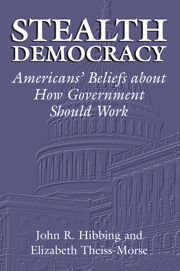 Cambridge: Cambridge University Press, 2002More Info → proposes that many citizens prefer effective and efficient policymaking to participatory and deliberative schemes. Contributing to this new research agenda, we suggest that a new hybrid and pluralistic model of democracy, one that incorporates “mini-publics,” can reach voters despite their reservations regarding more traditional forms of representative democracy.
Cambridge: Cambridge University Press, 2002More Info → proposes that many citizens prefer effective and efficient policymaking to participatory and deliberative schemes. Contributing to this new research agenda, we suggest that a new hybrid and pluralistic model of democracy, one that incorporates “mini-publics,” can reach voters despite their reservations regarding more traditional forms of representative democracy.
Contemporary perceptions of democracy
In a study of German citizens’ understanding of democracy, Landwehr and Steiner found that citizens seem to disagree on specific models of democracy.4Claudia Landwehr and Nils D. Steiner, “Where Democrats Disagree: Citizens’ Normative Conceptions of Democracy,” Political Studies 65, no. 4 (2017): 786–804. Employing an exploratory factor analysis, they find evidence for four distinct attitudinal patterns that may be interpreted as alternative understandings of democracy. Citizens who hold a “trustee conception of democracy” support procedures and institutions that insulate decision-making from electoral pressures and trust representatives to serve their interest. By contrast, “anti-pluralist sceptics” are concerned that competing interests compromise the common good and ask for a stronger voice of affected groups in politics. “Deliberative proceduralists” also value participation, albeit less as a means to control decision-makers and more to ensure rational discourse and public participation. Finally, “populist majoritarians” hold onto a united will of the people for which they are willing to—at least to some degree—sacrifice minority rights.
“They created a deliberative scenario—an online asynchronous discussion—to test which democratic preferences citizens might hold if they had the possibility to deliberate on this issue.”Although these different understandings of democracy are less comprehensive than the models of democracy advocated in the academic literature, they are fairly consistent with more developed models. The trustee conception, for instance, seems compatible with liberal models, while deliberative proceduralism seems similar to deliberative theories of democracy. Nonetheless, a limitation of this study is that pure survey-based research may tap into ill-informed attitudes and preferences, especially when citizens are confronted with highly abstract issues such as democratic governance schemes. In an experiment with 256 German citizens conducted in 2018, Goldberg et al. tried to overcome this deficiency.5Saskia Goldberg, Dominik Wyss, and André Bächtiger, “Deliberating or Thinking (Twice) about Democratic Preferences: What German Citizens Want from Democracy” (Paper under review, 2018). They created a deliberative scenario—an online asynchronous discussion—to test which democratic preferences citizens might hold if they had the possibility to deliberate on this issue. They find that preferences for democratic governance models are mainly driven by (situation-specific) issue salience and disenchantment with the actual shape of representative democracy. They also document a sort of “populist” impulse: when citizens experience low external efficacy and low satisfaction with democracy, they become more likely to support participatory governance models regardless of the specific designs of these models. Overall, a majority of German citizens seem to prefer an integrated or “pluralistic” model of democracy, where representative, deliberative, and direct-democratic schemes combine and complement each other.6Goldberg, Wyss, and Bächtiger, “Deliberating or Thinking (Twice) about Democratic Preferences.”
Such “pluralistic” schemes may be in tune with attempts at democratic renewal in the twenty-first century. As Warren and Pearse have noted, “systems that unify powers are increasingly dysfunctional within societies that are culturally democratizing, complex, and diverse.”7Mark E. Warren and Hilary Pearse, “The Separation of Powers and Democratic Renewal of Westminster Systems,” mimeo (2018). They suggest “retrofitting” existing political systems with additional democratic innovations, especially with deliberative mini-publics.
Do democratic innovations work?
When it comes to proposed renovations to democratic institutions, direct democracy has for a long time been the focus of most academic discussions. The strength of direct democracy lies in its capacity to include citizens in the political process and to strengthen their connection to political decisions. Empirical evidence from Switzerland suggests that direct democracy can enhance satisfaction with democracy.8Isabelle Stadelmann-Steffen and Adrian Vatter, “Does Satisfaction with Democracy Really Increase Happiness? Direct Democracy and Individual Satisfaction in Switzerland,” Political Behavior 34, no. 3 (2012): 535–559. However, direct democracy has a number of downsides that include: ill-informed citizens who may be unable to rationally decide on complex policies; tyranny of the majority, whereby populist initiatives can have negative consequences for vulnerable minorities;9→Adrian Vatter and Deniz Danaci, “Mehrheitstyrannei durch Volksentscheide? Zum Spannungsverhältnis zwischen direkter Demokratie und Minderheitenschutz,“ Politische Vierteljahresschrift 51, no. 2 (2010): 205–222.
→Jens Hainmueller and Dominik Hangartner, “Does Direct Democracy Hurt Immigrant Minorities? Evidence from Naturalization Decisions in Switzerland,” American Journal of Political Science (2015). and insufficient deliberation, whereby a direct democratic campaign does not “foster a meaningful deliberative process because it offers a winner-takes-all end point and so the faction able to secure a majority has no incentive to change minds or compromise and so need not deliberate in a genuine way with its opponents.”10Stephen Tierney, Constitutional Referendums: The Theory and Practice of Republican Deliberation (Oxford: Oxford University Press, 2012), 51.
In this essay, however, we do not seek to debate the pros and cons of direct democratic mechanisms,11For an excellent overview of this debate, see Wolfgang Merkel and Claudia Ritzi, eds., Die Legitimität direkter Demokratie: Wie demokratisch sind Volksabstimmungen? (Wiesbaden: SpringerVS Verlag, 2017). but instead concentrate on two novel ways of increasing citizen involvement in policymaking, namely citizen juries and deliberative mini-publics.
Compared to direct democracy, dialogue and deliberation constitute an alternative and, in several respects, superior way to involve citizens in policymaking. Deliberative institutional innovations promise to involve citizens in politics in more comprehensive ways, improve the adequacy and quality of decisions, and bolster decision acceptance. As the philosopher Cristina Lafont writes: “To the extent that citizens can mutually justify the political coercion they exercise over one another, they can see themselves as co-legislators or political equals in the precisely the way the democratic ideal of self-government requires.”12Cristina Lafont, “Can Democracy be Deliberative & Participatory? The Democratic Case for Political Uses of Mini-Publics,” Daedalus 146, no. 3 (2017): 85–105.
However, critics of deliberative mini-publics have argued that ordinary citizens do not want to deliberate13Hibbing and Theiss-Morse, Stealth Democracy. or that deliberation is more demanding than voting, meaning it privileges already advantaged citizens with higher incomes and education. For instance, some scholars argue that people with lower socioeconomic status lack rhetorical skills and tend to use different speaking styles less likely to be regarded as typical deliberative qualities—differences that may translate into a lack of influence. Moreover, group discussion—the hallmark of any deliberative event—sometimes triggers undesired dynamics, such as group polarization, reducing the normative value of the outcomes of mini-publics (such as opinion change).
“Claims that people do not want to deliberate may simply be exaggerated.”We regard such claims, which are highly popular in the contemporary literature on democracy,14→Christopher H. Achen and Larry M. Bartels, Democracy for Realists: Why Elections Do Not Produce Responsive Government (Princeton, NJ: Princeton University Press, 2016).
→Jason Brennan, Against Democracy (Princeton, NJ: Princeton University Press, 2016). as seriously mistaken. First, claims that people do not want to deliberate may simply be exaggerated. In an experiment on deliberative sessions involving US citizens and congressmen, Neblo et al. show that a desire to deliberate seems to exist among the majority of citizens: “[the] willingness to deliberate is much higher than indirect evidence from political behavior research might suggest, and that those most willing to deliberate are precisely those who are turned off by standard partisan and interest group politics.”15Michael A. Neblo, Kevin M. Esterling, Ryan P. Kennedy, and Anand E. Sokhey, “Who Wants to Deliberate—and Why?” American Political Science Review 104, no. 3 (2010): 36–37. Moreover, in a deliberative event, Neblo et al. show that traditional participation biases such as gender, age, income, or education tend to wither away.16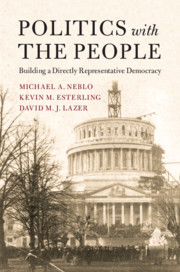 Cambridge, MA: Cambridge University Press, 2018More Info →
Cambridge, MA: Cambridge University Press, 2018More Info →
Second, empirical research shows that ordinary citizens have the ability to deliberate at good quality levels when deliberative events are well-structured—i.e., include supportive conditions such as information provision, expert hearings, and facilitator intervention.17For an concise overview, see André Bächtiger and Simon Beste, “Deliberative Citizens, (Non)Deliberative Politicians: A Rejoinder,” Daedalus 146, no. 3 (2017): 106–118. In an analysis of a transnational Deliberative Poll (“Europolis”)—representing a demanding setting for citizen deliberation—Gerber et al. found that “the standards of classic deliberation are far from being utopian standards that only very few citizen deliberators can achieve.”18Marlène Gerber, André Bächtiger, Susumu Shikano, Simon Reber, and Samuel Rohr, “Deliberative Abilities and Influence in a Transnational Deliberative Poll (EuroPolis),” British Journal of Political Science (September 15, 2016): 1–26. Moreover, different speaking styles and cultures had no impact on opinion formation: the views of more advantaged and more highly-skilled deliberators did not affect the views of less advantaged and less-skilled participants.19James S. Fishkin, Robert C. Luskin, and Alice Siu, “Europolis and the European Public Sphere: Empirical Explorations of a Counterfactual Ideal,” European Union Politics 15, no. 3 (2014): 328–351. Finally, opinion change in Europolis was the product of well-justified arguments and not of undesirable group dynamics such as group polarization.20Marlène Gerber, André Bächtiger, Irena Fiket, Marco Steenbergen, and Jürg Steiner, “Deliberative and Non-Deliberative Persuasion: Mechanisms of Opinion Formation in Europolis,” European Union Politics 15, no. 3 (2014): 410–29. Several studies have come to similar conclusions regarding the deliberative abilities of citizens, the nonviolation of egalitarian democratic ideals, and the argument-based nature of opinion change in mini-publics.21See, for example, Sean J. Westwood, “The Role of Persuasion in Deliberative Opinion Change,” Political Communication 32, no. 4 (2015): 509–28.
Overall, these findings challenge popular assumptions regarding citizen competencies for deliberative action. A key reason for these “surprising” findings may be found in the institutional setup: if an institution (like a mini-public) is explicitly geared toward deliberation, many well-known psychological biases and dynamics tend to wither away. As Neblo et al. concur, when citizens have the “means, motives, and opportunity” to become informed about politics, they behave differently than is portrayed in the “anemic view of democratic participation” implied by many democracy scholars.22Neblo, Esterling, and Lazer, Politics with the People.
From a substantive policy perspective, we frequently find that citizen preferences become more liberal and less populist after deliberation. In a deliberative poll in California (“What’s Next California”), Fishkin finds that support for a “populist” proposal for a part-time legislature with part-time pay dropped massively after deliberation.23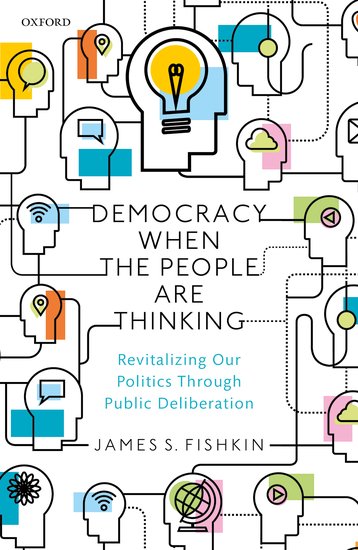 Oxford: Oxford University Press, 2018More Info → Another example for a reduction in populism through deliberation can be found in a deliberative field experiment in Swiss direct democracy.24André Bächtiger, Marco R. Steenbergen, Thomas Gautschi, and Seraina Pedrini, “Deliberation in Swiss Direct Democracy: A Deliberative Field Experiment on the Expulsion Initiative of the Swiss People’s Party,” NCCR Newsletter 8, no. 5 (2011). The topic of the field experiment was the expulsion initiative (Ausschaffungsinitiative) of the Swiss People’s Party (SVP) in 2010 and the counterproposal of the government and parliament. The expulsion initiative asked for a quasi-automatic expulsion of foreigners who have committed a number of designated crimes. We found that the online discussion group became more favorable to the counterproposal, trying to combine the popular demand for expulsion of criminal foreigners with the requirements of international and basic law.
Oxford: Oxford University Press, 2018More Info → Another example for a reduction in populism through deliberation can be found in a deliberative field experiment in Swiss direct democracy.24André Bächtiger, Marco R. Steenbergen, Thomas Gautschi, and Seraina Pedrini, “Deliberation in Swiss Direct Democracy: A Deliberative Field Experiment on the Expulsion Initiative of the Swiss People’s Party,” NCCR Newsletter 8, no. 5 (2011). The topic of the field experiment was the expulsion initiative (Ausschaffungsinitiative) of the Swiss People’s Party (SVP) in 2010 and the counterproposal of the government and parliament. The expulsion initiative asked for a quasi-automatic expulsion of foreigners who have committed a number of designated crimes. We found that the online discussion group became more favorable to the counterproposal, trying to combine the popular demand for expulsion of criminal foreigners with the requirements of international and basic law.
Challenges and ways forward
A notorious question for deliberative democrats concerns the consequentiality and policy impact of citizen deliberation. As Dryzek has noted, “Direct influence on and in policymaking is a hard test for mini-publics to pass. While examples exist of influence and impact, they are outnumbered by cases where a mini-public is established but turns out to have little or no effect on public decision-making.”25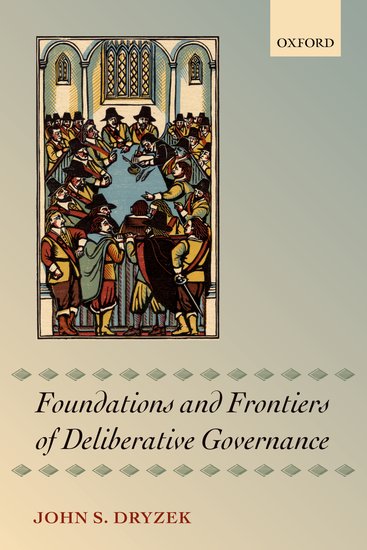 Oxford: Oxford University Press, 2010More Info → Put differently, while we do find deliberative virtuosity in well-structured mini-publics, there seems to be a lack of democratic viability in the latter. Direct democracy may fare better in this regard, since decisions are binding for policymakers (even though citizens’ frustration may be even higher when direct-democratic choices are not or cannot be implemented in straightforward ways).
Oxford: Oxford University Press, 2010More Info → Put differently, while we do find deliberative virtuosity in well-structured mini-publics, there seems to be a lack of democratic viability in the latter. Direct democracy may fare better in this regard, since decisions are binding for policymakers (even though citizens’ frustration may be even higher when direct-democratic choices are not or cannot be implemented in straightforward ways).
One way to improve on policy uptake is via “co-governance” schemes where citizens and politicians sit in the same room and deliberate and decide on specific policies. Prominent examples are the Irish Constitutional Conventions where 66 citizens and 33 politicians deliberated about same-sex marriage (and other constitutional issues), which then led to a nation-wide referendum.26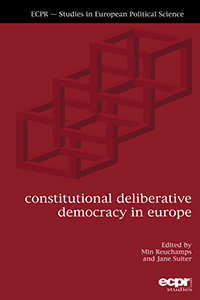 Colchester: ECPR Press, 2016More Info → Indeed, coupling mini-publics with direct democracy may help to overcome the consequentiality gap of the former while at the same time curing the vices of the latter, namely direct democracy’s deliberative deficit and its latent populist tendencies.
Colchester: ECPR Press, 2016More Info → Indeed, coupling mini-publics with direct democracy may help to overcome the consequentiality gap of the former while at the same time curing the vices of the latter, namely direct democracy’s deliberative deficit and its latent populist tendencies.
Another promising project is being pursued by Neblo et al., dubbed “directly representative democracy.”27Neblo, Esterling, and Lazer, Politics with the People. It starts from the idea that it is time to renew representative democracy by creating more direct exchanges between the represented and representatives. They do so by bringing MPs and citizens together, engaging them in a common deliberative forum on pressing issues of public policy.
Finally, deliberative mini-publics can also have functions beyond direct policy uptake. One prominent example is a “trust-based” function, which can inform citizens’ own later deliberations. The idea behind the trust-based function is that the (large) majority of nondeliberating citizens can trust the judgments of the (small) minority of deliberating citizens because that small minority, selected randomly for a deliberative mini-public, do not have to follow partisan logics of electoral representation and can focus instead on common concerns.28Mark E. Warren and John Gastil, “Can Deliberative Minipublics Address the Cognitive Challenges of Democratic Citizenship?” Journal of Politics 77, no. 2 (2015): 562–574. Some empirical evidence indicates this trust-based function works in practice: the more voters knew about the randomly selected British Columbia Citizen Assembly and Irish Citizen Convention, the more likely they were to vote for the mini-public’s policy recommendation in the later citizen referendum. In the US state of Oregon, mini-publics make recommendations to voters in direct democratic campaigns. Empirical evidence shows a substantial amount of voters take these recommendations as “cues” to inform their choices at the ballot.
In sum, democracy in the twenty-first century should move toward more hybrid models, combining representative, dialogic, and direct-democratic governance schemes.
In addition, in order to assess the merits and shortcomings of existing institutions and design complementary and alternative procedures, there is a demand for open and inclusive meta-deliberative processes.29Claudia Landwehr, “Democratic Meta-Deliberation: Towards Reflective Institutional Design,” Political Studies 63, S1 (2015): 38–54. The media, academia, civil society associations, and ordinary citizens should engage in exchanges about how and by whom collective decisions at different levels and in different policy areas should be taken. We believe that a pluralistic, meta-deliberative renewal of the procedural consensus is required to safeguard democracy in the face of populist and elitist challenges.
“In order to make this involvement reasoned and consequential, representative decision-making may need to be coupled with deliberative mini-publics (including co-governance structures) and direct democratic schemes.”Moreover, rather than adopting a “one size fits all” approach to democracy and claim that either representative, direct-democratic, or deliberative schemes are the best and only way to salvage democracy, we think a “problem-based” approach to democracy30→Mark E. Warren, “A Problem-Based Approach to Democratic Systems,” American Political Science Review 111, no. 1 (2017): 39–53.
→André Bächtiger and John Parkinson, Mapping and Measuring Deliberation (Oxford: Oxford University Press, 2019). is more appropriate. Such an approach takes the variety of citizens’ democratic preferences (under specific conditions) seriously and reimagines democracy in pluralistic and hybrid terms. For instance, given scarce resources for politics, many citizens are happy to “delegate” decision-making to elected representatives; but when citizens feel that issues affect them strongly, a substantial share of them demands more involvement (as our research shows). In order to make this involvement reasoned and consequential, representative decision-making may need to be coupled with deliberative mini-publics (including co-governance structures) and direct democratic schemes. In our view, only such hybrid schemes are apt at enhancing political support of citizens and make our democracies viable in the twenty-first century.
References:
→Jens Hainmueller and Dominik Hangartner, “Does Direct Democracy Hurt Immigrant Minorities? Evidence from Naturalization Decisions in Switzerland,” American Journal of Political Science (2015).
→Jason Brennan, Against Democracy (Princeton, NJ: Princeton University Press, 2016).
→André Bächtiger and John Parkinson, Mapping and Measuring Deliberation (Oxford: Oxford University Press, 2019).













